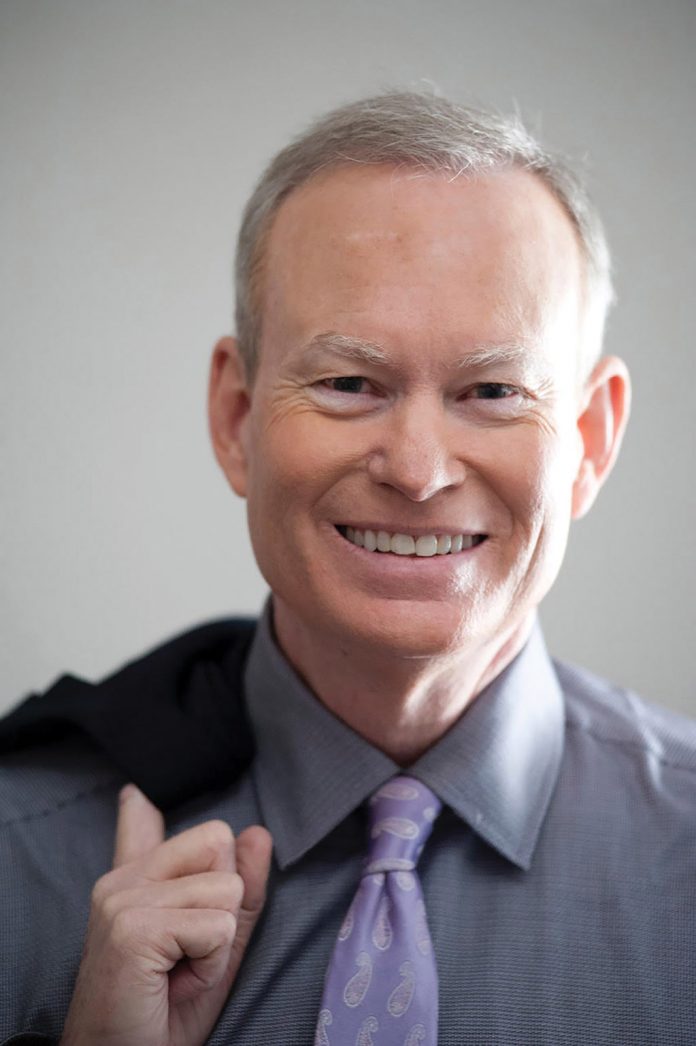by Traci Chapman
For Mick Cornett, standing still is not an option. Moving forward has always been his style – for 14 years he’s done just that, in the process taking with him Oklahoma’s largest municipality and changing both its landscape and its people.
Now, as he winds down his career as Oklahoma City’s 35th – and longest-serving – mayor, Cornett has set his sights on again moving forward, this time looking to address what some might see as insurmountable obstacles in putting the state back on the right track as he heads toward a Republican primary that could be the first step for the state’s next governor.
But, challenges are what Cornett is all about, those who have worked with him said. They are challenges embraced by a man whose campaign slogan is aptly entitled, “fix the mess.”
“Over and over as Terri (his wife) and I traveled the state, that’s what we heard from people – to ‘fix this mess,” Cornett said. “We listened, we saw the people are emotional; there’s frustration, there’s disappointment, there’s downright anger, and their expectations are not being met.”
Among those perhaps the most vocal about their dissatisfaction are Oklahoma seniors. Not only are seniors vital to the state’s success, they are almost always major constituency in any election. That’s a fact borne out by studies conducted by United States Election Project, which reveal consistently higher voting rates for voters ages 60 years and older across the country.
For those voters, taxes are key, Cornett said. While personal income taxes are important in any arena – federal, state, county or municipal, he said, a heavy hand can backfire, resulting in revenue drops that come about when wealthy residents choose to find a more attractive place to live.
Quality of life is another concern – and, for seniors and those who care for them, health and wellness are crucial to maintaining the kind of life they want to live. That’s where Oklahoma City’s $52 million senior health and wellness project comes in, Cornett said.
“This project is so important because it impacts that basic health and wellness issue,” he said. “It’s proved to be everything we thought, as we look at the 4,000 members we already have – they had to take a leap of faith, and it paid off.”
Part of MAPS 3, a 1-cent sales tax, $777 million capital improvement program approved by voters charged with making debt-free investments in public facilities, the senior health and wellness project encompasses four centers, to be scattered throughout Oklahoma City. The first 40,272-square-foot building, located at 11501 North Rockwell Avenue, offers everything from workout facilities, gymnasium, aerobics and heated indoor saltwater swimming pool to fitness, cooking, art classes and classrooms, a lounge, health screenings and other amenities.
A second facility, located on South Walker Avenue, is set to open this year; two more – one slated for northeast Oklahoma City and a fourth likely situated in the city’s southern sector, but with a location not yet determined – are expected to open in the next three years or so.
The overall project and its four centers are a testament to Cornett’s determination and ability to forge partnerships to get things done, city officials said – and, partnerships are key to the project’s success, with independent entities given responsibility for operating each facility, while Oklahoma City funded construction and major maintenance costs.
Nonprofit Healthy Living and Fitness runs the Rockwell Center, while NorthCare – an established mental health and substance abuse service provider – will operate the second, 39,000-square-foot Capitol Hill facility. Langston University is set to partner with Oklahoma City on the northeast space, anticipated to open sometime in 2019, officials said.
Cornett said an important aspect of the centers was accessibility – while those who can afford to pay a membership fee will be asked to do so, those fees would be assessed on a sliding schedule based on income. Centers are open to anyone aged 50 years or older, whether an Oklahoma City resident or not.
“We won’t turn them away – we’ll find a way to get them there,” he said.
Promoting health and fitness is nothing new to Cornett, who by 2007 had not only celebrated his own weight loss but challenged others to do the same. Putting Oklahoma City on a diet, less than five years later residents across the municipality collectively met the 1-million-pound weight loss goal.
It was an achievement that illustrated one of the most important tenets of his life – to face challenges head-on and to fulfill the promises he’s made in the process.
“That’s one of the things I am most proud of – we’ve done what we said we’re going to do,” Cornett said. “I want to do big things, and I believe it’s easier to accomplish when people know you’re telling the truth, they know you’re going to do what you say you’re going to do.”
“Big things” are what those who worked with Cornett said they’ve come to expect. He first took office in March 2004, after serving as a city council member since 2001. The only four-term mayor in the municipality’s history, officials said Cornett was essential in a variety of accomplishments, from bringing the NBA to the city to increasing investments in infrastructure and schools – which, in turn, led to a spike in job creation and private sector investment.
MAPS for Kids was completed on Cornett’s watch, while MAPS 3 was one of his overriding passions, a myriad of quality of life projects including not only the four-facility senior wellness center package, but also a 70-acre downtown park, streetcar system, whitewater rafting facility, new fairgrounds expo building and convention center and hundreds of miles of sidewalks and bike trails across Oklahoma City.
Beyond MAPS, Cornett focused on what officials called one of the most extensive public school capital improvement projects in the country, a $700 million effort aimed at renovating or building schools throughout Oklahoma City. That program impacted more than 70 schools and resulted in the 2014 opening of the $12 million John Rex Charter Elementary School, located downtown.
Project 180, a 2009 $140 million downtown street and sidewalk redesign effort overseen by Cornett was a glimpse into yet another major effort, the 2017 Better Streets, Safer City initiative, passed by voters in September. Championed and led by Cornett that 13-item, 10-year, $967 million package will fund a range of items, including streets, police and fire department improvements, parks and more, officials said.
“For a time, it seemed we kept waiting for somebody to save us, but I knew that would never happen until we invested in ourselves,” he said.
That investment has led to 10,000 new businesses and 100,000 new jobs across the Oklahoma City metropolitan area since Cornett became mayor, he said.
Cornett’s achievements – and a list of honors from a multitude of sources – transcend Oklahoma City government. In 2015, he teamed up New York Mayor Bill de Blasio to demonstrate mayors’ bipartisan support for a fully funded transportation infrastructure bill – an effort that helped spur a five-year, $300 billion federal transportation programs and infrastructure bill.
A fifth-generation Oklahoman, Cornett was born and raised in Oklahoma City, attending Putnam City Public Schools, where his mother worked for years as a first-grade teacher. His father was a postal worker. They were parents whose lives had been lived under the specter of the Great Depression and who passed on their work ethic to their children – something Cornett said he never left behind.
Graduating with a journalism degree from University of Oklahoma, Cornett worked for about 20 years as a broadcast news reporter anchor and manager. In 2009, realizing his formal education was a “little outdated,” he enrolled in New York University’s Executive MBA program, taking 45 trips back and forth to that school for a degree he completed in 2011.
While Cornett is well-known across Oklahoma City, he said he knows serving as governor is much different. That prompted his statewide travels, speaking – and, more importantly, listening to – people from all 77 counties, he said. Now the countdown is on to the June 26 primary; if necessary, runoff primaries will be held Aug. 28, while the general election is set for Nov. 6.
“I’ve always had Oklahoma City’s best interests in mind, of course, but I’m an Oklahoman – and I care about our state and all its people,” Cornett said. “Now, it’s time to look to the future for all of us.”














